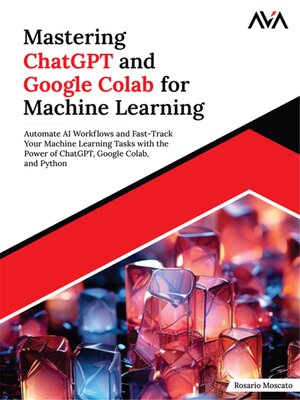Mastering ChatGPT and Google Colab for Machine Learning
ebook ∣ Automate AI Workflows and Fast-Track Your Machine Learning Tasks with the Power of ChatGPT, Google Colab, and Python
By Rosario Moscato

Sign up to save your library
With an OverDrive account, you can save your favorite libraries for at-a-glance information about availability. Find out more about OverDrive accounts.
Find this title in Libby, the library reading app by OverDrive.



Search for a digital library with this title
Title found at these libraries:
| Library Name | Distance |
|---|---|
| Loading... |
Learn how to harness the power of ChatGPT to streamline data analysis, accelerate model development, and unlock innovative solutions to real-world problems.
Key Features● Step-by-step progression from foundational machine learning concepts to advanced techniques using ChatGPT and Google Colab.
● Clear and detailed instructions for data preparation, model training, and evaluation, simplifying complex machine learning tasks.
● Extensive use of Google Colab for coding and experimentation, providing a real-world platform to apply learned techniques effectively.
Book DescriptionUnlock the future of machine learning by mastering Google Colab, trusted by over 5 million data scientists, and ChatGPT, powering 100 million users worldwide. This book bridges the latest in AI with practical, hands-on applications for data science.
With these game-changing tools at your command, you'll be able to streamline complex workflows, automate tedious tasks, and propel your AI skills to new heights—making machine learning faster, smarter, and more accessible than ever before.
Each chapter unfolds a specific aspect of data science and machine learning, seamlessly integrated with ChatGPT's free version capabilities. The foundational chapters introduce key machine learning concepts, while advanced sections explore topics such as natural language processing, sentiment analysis, and predictive analytics—all illustrated with real-world examples and interactive exercises. The later chapters focus on optimizing tasks using the more powerful paid version of ChatGPT, culminating in the creation of a custom GPT named "Data Scientist" to tackle specialized challenges.
Additionally, the book includes a section on best practices, expert tips, and interview questions, making it a comprehensive resource for aspiring data scientists and seasoned professionals alike.
What you will learn● Learn to integrate and optimize ChatGPT and Google Colab for enhanced data science tasks.
● Master techniques for preparing and cleaning data for analysis.
● Gain a solid grasp of statistical concepts essential for data science.
● Learn the processes for training, evaluating, and refining machine learning models.
● Perform data analysis and preprocessing using natural language processing techniques.
Table of Contents1. Introduction to ChatGPT
2. ChatGPT for Data Science and Machine Learning
3. Fundamentals of Statistics for Data Science
4. Missing Values and Outliers
5. Relation Between Variables and Charts
6. Data Preparation
7. Training and Evaluation
8. Fine Tuning, Features Selection, and Final Model
9. Data Preparation and Training
10. Fine Tuning and Final Model
11. Data Analysis and Dataset Manipulation (NLP)
12. Sentiment Analysis and Predictions
13. ChatGPT-4 for a Completely Automated Data Science Workload
14. Customizing GPT for Applications
15. Takeaways and Conclusions
Index
Key Features● Step-by-step progression from foundational machine learning concepts to advanced techniques using ChatGPT and Google Colab.
● Clear and detailed instructions for data preparation, model training, and evaluation, simplifying complex machine learning tasks.
● Extensive use of Google Colab for coding and experimentation, providing a real-world platform to apply learned techniques effectively.
Book DescriptionUnlock the future of machine learning by mastering Google Colab, trusted by over 5 million data scientists, and ChatGPT, powering 100 million users worldwide. This book bridges the latest in AI with practical, hands-on applications for data science.
With these game-changing tools at your command, you'll be able to streamline complex workflows, automate tedious tasks, and propel your AI skills to new heights—making machine learning faster, smarter, and more accessible than ever before.
Each chapter unfolds a specific aspect of data science and machine learning, seamlessly integrated with ChatGPT's free version capabilities. The foundational chapters introduce key machine learning concepts, while advanced sections explore topics such as natural language processing, sentiment analysis, and predictive analytics—all illustrated with real-world examples and interactive exercises. The later chapters focus on optimizing tasks using the more powerful paid version of ChatGPT, culminating in the creation of a custom GPT named "Data Scientist" to tackle specialized challenges.
Additionally, the book includes a section on best practices, expert tips, and interview questions, making it a comprehensive resource for aspiring data scientists and seasoned professionals alike.
What you will learn● Learn to integrate and optimize ChatGPT and Google Colab for enhanced data science tasks.
● Master techniques for preparing and cleaning data for analysis.
● Gain a solid grasp of statistical concepts essential for data science.
● Learn the processes for training, evaluating, and refining machine learning models.
● Perform data analysis and preprocessing using natural language processing techniques.
Table of Contents1. Introduction to ChatGPT
2. ChatGPT for Data Science and Machine Learning
3. Fundamentals of Statistics for Data Science
4. Missing Values and Outliers
5. Relation Between Variables and Charts
6. Data Preparation
7. Training and Evaluation
8. Fine Tuning, Features Selection, and Final Model
9. Data Preparation and Training
10. Fine Tuning and Final Model
11. Data Analysis and Dataset Manipulation (NLP)
12. Sentiment Analysis and Predictions
13. ChatGPT-4 for a Completely Automated Data Science Workload
14. Customizing GPT for Applications
15. Takeaways and Conclusions
Index







